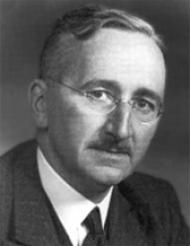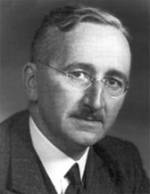Friedrich August Hayek CH ( 8 May 1899 – 23 March 1992), born in Austria-Hungary as Friedrich August von Hayek and frequently known as F. A. Hayek, was an Austrian, later turned British, economist and philosopher best known for his defense of classical liberalism. In 1974, Hayek shared the Nobel Memorial Prize in Economic Sciences (with Gunnar Myrdal) for his "pioneering work in the theory of money and economic fluctuations and ... penetrating analysis of the interdependence of economic, social and institutional phenomena".
Hayek is a major economist and political thinker of the twentieth century. Hayek's account of how changing prices communicate information which enables individuals to coordinate their plans is widely regarded as an important achievement in economics. He also contributed to the fields of systems thinking, jurisprudence, neuroscience and the history of ideas.
Hayek served in World War I and said that his experience in the war and his desire to help avoid the mistakes that had led to the war led him to his career. Hayek lived in Austria, Great Britain, the United States and Germany, and became a British subject in 1938. He spent most of his academic life at the London School of Economics (LSE), the University of Chicago, and the University of Freiburg.
In 1984, he was appointed as a member of the Order of the Companions of Honour by Queen Elizabeth II on the advice of Prime Minister Margaret Thatcher for his "services to the study of economics". He also received the US Presidential Medal of Freedom in 1991 from president George H. W. Bush. In 2011, his article The Use of Knowledge in Society was selected as one of the top 20 articles published in the American Economic Review during its first 100 years.
Early life
Hayek was born in Vienna (then the capital of Austria-Hungary), and was the son of August von Hayek, a doctor in the municipal health service. Hayek's grandfathers were prominent academics working in the fields of statistics and biology. His paternal line had been raised to the ranks of the Bohemian nobility for its services to the state. Similarly, a generation before his maternal forebears had also been raised to the lower noble rank. However, after 1919 titles of nobility were banned by law in Austria, and the "von Hayek" family became simply the Hayek family. Hence, after 1919, Hayek's legal name became "Friedrich Hayek", not "Friedrich von Hayek". Hayek's father turned his work on regional botany into a highly esteemed botanical treatise, continuing the family's scholarly traditions.
On his mother's side, Hayek was second cousin to the philosopher Ludwig Wittgenstein. His mother often played with Wittgenstein's sisters, and had known Ludwig well. As a result of their family relationship, Hayek became one of the first to read Wittgenstein's Tractatus Logico-Philosophicus when the book was published in its original German edition in 1921. Although Hayek only met Wittgenstein on a few occasions, Hayek said that Wittgenstein's philosophy and methods of analysis had a profound influence on his own life and thought. In his later years, Hayek recalled a discussion of philosophy with Wittgenstein, when both were officers during World War I. After Wittgenstein's death, Hayek had intended to write a biography of Wittgenstein and worked on collecting family materials, and he later assisted biographers of Wittgenstein.
At his father's suggestion as a teenager, Hayek read the genetic and evolutionary works of Hugo de Vries and the philosophical works of Ludwig Feuerbach. In school Hayek was much taken by one instructor's lectures on Aristotle's ethics.
In 1917, he joined an artillery regiment in the Austro-Hungarian Army and fought on the Italian front. Much of Hayek's combat experience was spent as a spotter in an aeroplane. Hayek suffered damage to his hearing in his left ear during the war, and was decorated for bravery. During this time Hayek also survived the 1918 flu pandemic.
Hayek then decided to pursue an academic career, determined to help avoid the mistakes that had led to the war. Hayek said about his experience: "The decisive influence was really World War I. It's bound to draw your attention to the problems of political organization." He vowed to work for a better world.
Education and career
At the University of Vienna, he earned doctorates in law and political science in 1921 and 1923 respectively, and he also studied philosophy, psychology, and economics. For a short time, when the University of Vienna closed, Hayek studied in Constantin von Monakow's Institute of Brain Anatomy, where Hayek spent much of his time staining brain cells. Hayek's time in Monakow's lab, and his deep interest in the work of Ernst Mach, inspired Hayek's first intellectual project, eventually published as The Sensory Order (1952). It located connective learning at the physical and neurological levels, rejecting the "sense data" associationism of the empiricists and logical positivists. Hayek presented his work to the private seminar he had created with Herbert Furth called the Geistkreis.
During his years at the University of Vienna, Carl Menger's work on the explanatory strategy of social science and Friedrich von Wieser's commanding presence in the classroom left a lasting influence on Hayek. Upon the completion of his examinations, Hayek was hired by Ludwig von Mises on the recommendation of Wieser as a specialist for the Austrian government working on the legal and economic details of the Treaty of Saint Germain. Between 1923 and 1924 Hayek worked as a research assistant to Prof. Jeremiah Jenks of New York University, compiling macroeconomic data on the American economy and the operations of the U.S. Federal Reserve.
Initially sympathetic to Wieser's democratic socialism, Hayek's economic thinking shifted away from socialism and toward the classical liberalism of Carl Menger after reading Ludwig von Mises' book Socialism. It was sometime after reading Socialism that Hayek began attending Ludwig von Mises' private seminars, joining several of his university friends, including Fritz Machlup, Alfred Schutz, Felix Kaufmann,and Gottfried Haberler, who were also participating in Hayek's own, more general, private seminar. It was during this time that he also encountered and befriended noted political philosopher Eric Voegelin, with whom he retained a long-standing relationship.
With the help of Mises, in the late 1920s Hayek founded and served as director of the Austrian Institute for Business Cycle Research, before joining the faculty of the London School of Economics (LSE) in 1931 at the behest of Lionel Robbins. Upon his arrival in London, Hayek was quickly recognized as one of the leading economic theorists in the world, and his development of the economics of processes in time and the coordination function of prices inspired the ground-breaking work of John Hicks, Abba Lerner, and many others in the development of modern microeconomics.
In 1932, Hayek suggested that private investment in the public markets was a better road to wealth and economic coordination in Britain than government spending programs, as argued in a letter he co-signed with Lionel Robbins and others in an exchange of letters with John Maynard Keynes in The Times. The nearly decade long deflationary depression in Britain dating from Churchill's decision in 1925 to return Britain to the gold standard at the old pre-war, pre-inflationary par was the public policy backdrop for Hayek's single public engagement with Keynes over British monetary and fiscal policy, otherwise Hayek and Keynes agreed on many theoretical matters, and their economic disagreements were fundamentally theoretical, having to do almost exclusively with the relation of the economics of extending the length of production to the economics of labor inputs.
Economists who studied with Hayek at the LSE in the 1930s and the 1940s include Arthur Lewis, Ronald Coase, John Kenneth Galbraith, Abba Lerner, Nicholas Kaldor, George Shackle, Thomas Balogh, Vera Smith, L. K. Jha, Arthur Seldon, Paul Rosenstein-Rodan, and Oskar Lange. Hayek also taught or tutored all sorts of other L.S.E. students, including David Rockefeller.
Unwilling to return to Austria after the Anschluss brought it under the control of Nazi Germany in 1938, Hayek remained in Britain and became a British subject in 1938. He held this status for the remainder of his life, but he did not live in Great Britain after 1950. He lived in the United States from 1950 to 1962 and then mostly in Germany but also briefly in Austria.
Nobel laureate
On 9 October 1974, it was announced that Hayek would be awarded the Nobel Memorial Prize in Economics, along with Swedish socialist economist Gunnar Myrdal. The reasons for the two of them winning the prize are described in the Nobel committee's press release. He was surprised at being given the award and believed that he was given it with Myrdal in order to balance the award with someone from the opposite side of the political spectrum.
During the Nobel ceremony in December 1974, Hayek met the Russian dissident Aleksandr Solzhenitsyn. Hayek later sent him a Russian translation of The Road to Serfdom. Although he spoke with apprehension at his award speech about the danger which the authority of the prize would lend to an economist, the prize brought much greater public awareness of Hayek and has been described by his biographer as "the great rejuvenating event in his life".


























